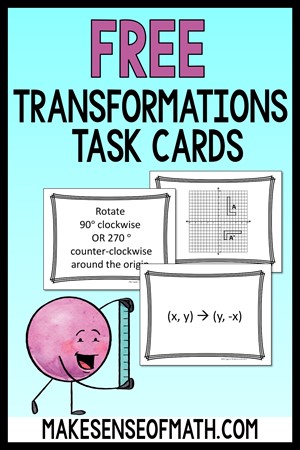CLICK HERE to grab these transformation task cards free from the Free Resource Library.
These 36 transformation task cards are perfect to make
sense of and reinforce transformations and coordinate rules. There are 12 matching sets covering
rotations, reflections, dilations and translations. Each set includes a visual of the
transformation, the corresponding coordinate rule, and a written explanation of
the transformation. These are perfect to
make sense of transformations as well as to reinforce the concepts.
Uses in Your Classroom
- Games: Matching, Go Fish, Spoons, etc, …
- Exit slips
- Openers
- Math Stations
- Quick formative assessments
- Putting groups together
- Pair work or individual work
Questions to Accompany Task Cards
- Given the visual transformation write a coordinate rule
- Given the visual transformation explain in words what is happening in the transformation
- Given a coordinate rule draw a visual transformation that follows the rule
- Given a coordinate rule explain whether the new figure will be congruent and/or similar to the original figure
- Given a coordinate rule explain in words what is happening with the transformation
- Given the written description write a coordinate rule
- Given the written description draw a graph that follow the rules
Make Sense of Transformations
Higher-order thinking ideas to help students
make sense of transformations. Laminate cards (or place in plastic sleeves) so that students can write on the cards with a dry erase marker while doing the following activities.
Reflections:
Have students connect corresponding points and
notice that the lines are parallel but not the same length. Ask them if this will always be the case.
Have them justify their reasoning. They
can draw additional reflections and continue to analyze. Have them practice reflecting over lines that
are not the axes. Challenge them to
write a coordinate rule for their new reflection. Again, have them analyze lines connecting
corresponding points, are they still parallel?
How do the lines compare to the line of reflection? They should notice that the lines are
perpendicular.
Rotations:
Have students connect only one set of
corresponding points to the center of rotation and measure the created angle
with a protractor. Students should be
able to verify that this is the degree of rotation. Also, guide the students to notice that the
length of their lines are also the same length.
You can move deeper into this idea by using compasses. Ask the students
if corresponding points will always be the same distance from the center of
rotation. Have students justify their
reasoning. Students can practice
rotating the figure varying amount of degrees.
Translation:
Have students connect corresponding points and
notice that the lines are parallel, and the same magnitude (length) Will this always be the case? Will the lines
always be parallel and the same length?
Have them justify their reasoning.
Have them draw more translations and continue to analyze and justify
their reasoning.
Dilations:
Have students connect corresponding points and
extend the lines until they intersect.
Students should notice that these lines intersect at the center of
dilation. Challenge them to draw a new
dilation with a different center of dilation and check their thinking.
CLICK HERE to grab these transformation task cards free from the Free Resource Library. The password will be sent directly to your email provided.










